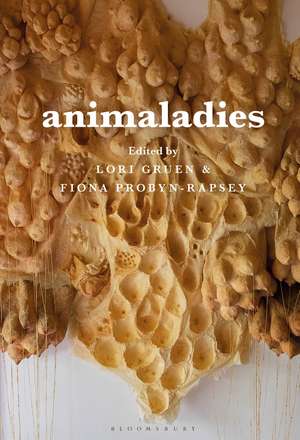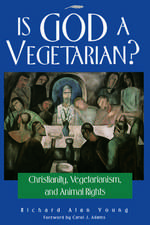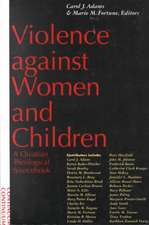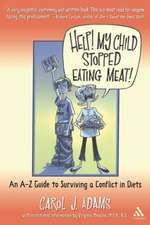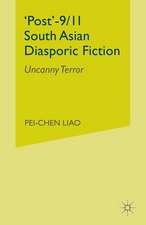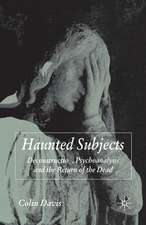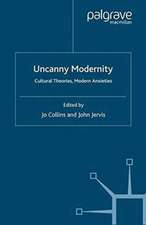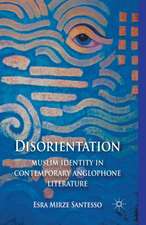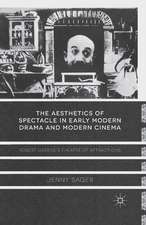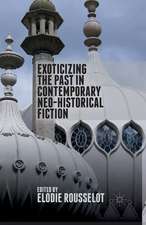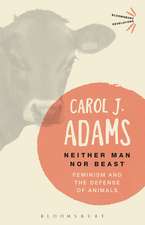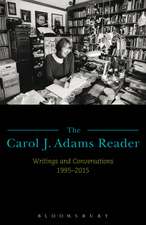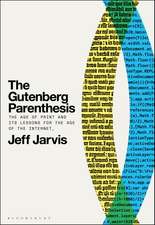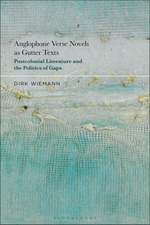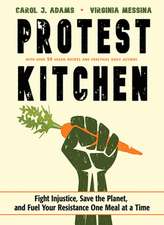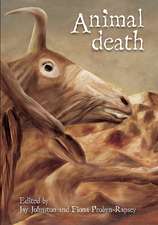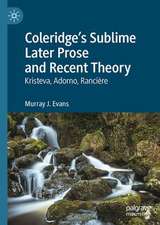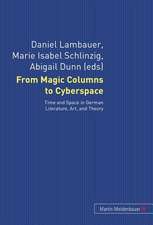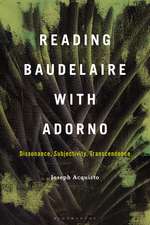Animaladies: Gender, Animals, and Madness
Editat de Lori Gruen, Professor Fiona Probyn-Rapsey Cuvânt după de Carol J. Adamsen Limba Engleză Paperback – 27 mai 2020
| Toate formatele și edițiile | Preț | Express |
|---|---|---|
| Paperback (1) | 224.48 lei 6-8 săpt. | |
| Bloomsbury Publishing – 27 mai 2020 | 224.48 lei 6-8 săpt. | |
| Hardback (1) | 773.39 lei 6-8 săpt. | |
| Bloomsbury Publishing – 28 noi 2018 | 773.39 lei 6-8 săpt. |
Preț: 224.48 lei
Preț vechi: 288.75 lei
-22% Nou
Puncte Express: 337
Preț estimativ în valută:
42.96€ • 46.65$ • 36.09£
42.96€ • 46.65$ • 36.09£
Carte tipărită la comandă
Livrare economică 23 aprilie-07 mai
Preluare comenzi: 021 569.72.76
Specificații
ISBN-13: 9781501364143
ISBN-10: 1501364146
Pagini: 264
Dimensiuni: 152 x 229 x 17 mm
Greutate: 0.36 kg
Editura: Bloomsbury Publishing
Colecția Bloomsbury Academic
Locul publicării:New York, United States
ISBN-10: 1501364146
Pagini: 264
Dimensiuni: 152 x 229 x 17 mm
Greutate: 0.36 kg
Editura: Bloomsbury Publishing
Colecția Bloomsbury Academic
Locul publicării:New York, United States
Caracteristici
The pathologization of human-animal relations has been little-explored, and this volume will approach the issue from both psychological and political perspectives
Notă biografică
Lori Gruen is William Griffin Professor of Philosophy at Wesleyan University, USA, where she is also a professor of Feminist, Gender, and Sexuality Studies and coordinates Wesleyan Animal Studies. She is co-editor, with Carol J. Adams, of Ecofeminsim: Feminist Intersections with Other Animals and the Earth (Bloomsbury, 2014).Fiona Probyn-Rapsey is Professor in the School of Humanities and Social Inquiry at the University of Wollongong, Australia. She is author of Made to Matter: White Fathers, Stolen Generations (2013) as well as co-editor of Animal Death (2013) and Animals in the Anthropocene: Critical Perspectives on Non-human Futures (2015).
Cuprins
List of IllustrationsNotes on ContributorsAcknowledgmentsDistillationsLori Gruen (Wesleyan University, USA) and Fiona Probyn-Rapsey (University of Wollongong, Australia)Part I: Dismember1. Just Say No to LobotomyLori Gruen (Wesleyan University, USA)2. Making and Unmaking Mammalian Bodies: Sculptural Practice as Traumatic Testimonylynn mowson (University of Melbourne, Australia)3. There's Something About the Blood.: Tactics of Evasion within Narratives of ViolenceNekeisha Alayna Alexis (Independent Scholar, USA)4. Erupt the SilenceHayley Singer (University of Melbourne, Australia)5. The Loneliness and Madness of Witnessing: Reflections from a Vegan Feminist KilljoyKatie Gillespie (Wesleyan University, USA)Part II: Disability6. Ableism, Speciesism, Animals, and Autism: The Devaluation of Interspecies FriendshipsHannah Monroe (Brock University, Canada)7. Metaphors and Maladies: Against Psychologizing SpeciesismGuy Scotton (Independent Scholar, Australia)8. The Horrific History of Comparisons between Cognitive Disability and Animality (and How to Move Past It)Alice Crary (New School for Social Research, USA)9. The Personal Is Political: Orthorexia Nervosa, the Pathogenization of Veganism, and Grief as a Political ActVasile Stanescu (Mercer University, USA) and James Stanescu (American University, USA)10. Women, Anxiety and Companion Animals: Toward a Feminist Animal Studies of Interspecies Care and SolidarityHeather Fraser (Flinders University, Australia) and Nik Taylor (Flinders University, Australia)Part III: Dysfunction11. The 'Crazy Cat Lady'Fiona Probyn-Rapsey (University of Wollongong, Australia)12. The Role of Dammed and Damned Desire in Animal Exploitation and Liberationpattrice jones (VINE Sanctuary, USA) and Cheryl Wylie (VINE Sanctuary, USA)13. Duck Lake Project: Art Meets Activism in an Anti-hide, Anti-bloke, Antidote to Duck ShootingYvette Watt (University of Tasmania, Australia)14. On Outcast Women, Dog Love, and Abjection between SpeciesLiz Bowen (Columbia University, USA)Afterword: DiscussionCarol J. AdamsIndex
Recenzii
Animaladies is a provocative, interdisciplinary volume linking the ways gender and animal rights activism are associated with sentiment and, often, insanity as a way of undermining its political aims. Sections address the affective labor of feminist animal rights, the linkages between disability and animal rights via understanding of 'madness,' and finally the entwined politics of resistance to exploitation and violence based on gender and species hierarchy. The opening essay from the editors provides a concise argument for the ways concern for the treatment of animals is pathologized through its linkage with 'mad women' and feminine emotional excess. At its strongest, the volume includes engaging discussions of the debates within disability studies about problematic attempts to inject 'reason' into animal rights through stigmatizing disability, rather than exploring the ways in which disability activism, feminism, and animal rights activism have all challenged the disembodied, reasoning subject . The breadth and novelty of the scholarship is worth engaging for feminist, animality studies, and disability studies scholars. Summing Up: Recommended.
Women who are thought mad because they love animals, live with (too many) animals, won't eat animals, or object to the abuse of animals; women who are mad, or have gone mad, from witnessing the relentless abuse of animals. These are just some of the intersections of gender, animality, and disability explored by the artists, activists and scholars who have contributed essays to this important interdisciplinary volume. Animaladies is a groundbreaking work and should be read by feminist, animal studies, and disability studies scholars and activists, and all those working at the intersections of these fields.
Animaladies marks a pivotal moment in intersectional Animal Studies: this volume urges us to confront myriad forms of oppression and marginalization that arise from prejudices about women, animals, and 'madness'--a trio of underdogs if ever there was one. Gruen and Probyn-Rapsey bring together work by an impressive list of international scholars to ensure that, like its title, Animaladies is fresh, provocative and defiant. As a former mental health professional, an academic with a background in feminist psychology and a proud 'crazy cat lady,' I have found no other volume in Feminist Animal Studies that has moved me as much emotionally, or galvanized me more to activism. This book will be a crucial new reading for students in my classes on gender and sexuality, human-animal relations, medicalization and disability studies.
Reclaiming the 'crazy' is a central aim of this brilliant and provocative book. Original and unsettling, it offers a completely new perspective on human-animal relationships. Animaladies explores how animal advocates (mainly women) are pathologized as 'crazy' by societies who themselves live in states of contradiction, denying their own acts of cruelty towards non-human animals while at the same time pretending to value life. It casts a probing light on the dysfunction of societies that continue to exploit, torture and murder countless animals on a daily basis, the justifications they use and their intolerance towards those who care. This rich collection of inspirational essays, explores the complex connections between ideas of gender, madness and animality. It speaks to all those concerned about the maladies of the present age, our distrust of emotions, our damaged relationships with animals, the future of the planet and what it means to be human and animal in the twenty-first century.
Women who are thought mad because they love animals, live with (too many) animals, won't eat animals, or object to the abuse of animals; women who are mad, or have gone mad, from witnessing the relentless abuse of animals. These are just some of the intersections of gender, animality, and disability explored by the artists, activists and scholars who have contributed essays to this important interdisciplinary volume. Animaladies is a groundbreaking work and should be read by feminist, animal studies, and disability studies scholars and activists, and all those working at the intersections of these fields.
Animaladies marks a pivotal moment in intersectional Animal Studies: this volume urges us to confront myriad forms of oppression and marginalization that arise from prejudices about women, animals, and 'madness'--a trio of underdogs if ever there was one. Gruen and Probyn-Rapsey bring together work by an impressive list of international scholars to ensure that, like its title, Animaladies is fresh, provocative and defiant. As a former mental health professional, an academic with a background in feminist psychology and a proud 'crazy cat lady,' I have found no other volume in Feminist Animal Studies that has moved me as much emotionally, or galvanized me more to activism. This book will be a crucial new reading for students in my classes on gender and sexuality, human-animal relations, medicalization and disability studies.
Reclaiming the 'crazy' is a central aim of this brilliant and provocative book. Original and unsettling, it offers a completely new perspective on human-animal relationships. Animaladies explores how animal advocates (mainly women) are pathologized as 'crazy' by societies who themselves live in states of contradiction, denying their own acts of cruelty towards non-human animals while at the same time pretending to value life. It casts a probing light on the dysfunction of societies that continue to exploit, torture and murder countless animals on a daily basis, the justifications they use and their intolerance towards those who care. This rich collection of inspirational essays, explores the complex connections between ideas of gender, madness and animality. It speaks to all those concerned about the maladies of the present age, our distrust of emotions, our damaged relationships with animals, the future of the planet and what it means to be human and animal in the twenty-first century.
